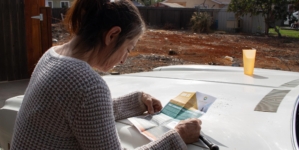-
Democratic Pundit Urges ‘Revolt’ Against Dem Leaders at Conservative Event - 32 mins ago
-
Human Beings Are Not Predators By Nature - 39 mins ago
-
Silver Slugger Award Winner Could Be Next First Baseman Moved: Report - about 1 hour ago
-
‘Christmas Adam’ Celebrations on Dec. 23 Spread in Some Parts of the U.S. - about 1 hour ago
-
Famous San Pedro fish market signs 49-year lease to stay in West Harbor - 2 hours ago
-
Phillies Acquire Jesus Luzardo From NL East Rival Marlins: Reports - 2 hours ago
-
Removing Carbon From the Sky Could Be the Next Climate Gold Rush - 2 hours ago
-
California’s rush to regulate AI has a 1st Amendment problem - 2 hours ago
-
Face of Shelter Dog Spending His Fourth Christmas Alone Breaks Hearts - 2 hours ago
-
The Enigma of Bob Dylan - 3 hours ago
Time and funding are running out for Little Tokyo senior meal program
Every weekday morning, drivers arrive at the Little Tokyo Towers at 10 a.m. carrying precious cargo: seniors’ meals individually wrapped in tinfoil. Not too salty, not too sweet, each bento box is carefully portioned by food group to meet federal nutrition standards.
Since 1976, Little Tokyo Senior Nutrition Services has sought to address food insecurity and social isolation among Asian American seniors in Los Angeles. Its meals are sold for $3.50 each and offered for free to those unable to pay.
“People have this misconception of ‘all Asians are wealthy,’” said Darlene Kuba, president of Little Tokyo Senior Nutrition Services. “Well, that’s not the case.”
One in 10 Asian Americans face poverty in the U.S., a fact that is often disguised by the wealth gap that exists between different ethnic groups.

A woman walks away with her daily meal provided by the nonprofit Little Tokyo Senior Nutrition Services at the Little Tokyo Towers in Los Angeles.
(Genaro Molina / Los Angeles Times)
Little Tokyo Senior Nutrition Services delivers more than 100 meals daily to seniors in Little Tokyo and Boyle Heights — a vital service to those who can no longer cook or shop for groceries independently. But the program is facing an uncertain future. Many of its staff and volunteers are the same age as the people they serve.
Perhaps more pressing are the funding challenges the meals program is facing. Little Tokyo Senior Nutrition Services is funded by the city of Los Angeles through a subcontract it has with the Watts Labor Community Action Committee, which in turn is contracted with the city Department of Aging.
Kuba alleges the Watts Labor Community Action Committee has not been reimbursing her organization fully or on time for senior services, which has led to delays in paying the caterer, Far Bar, a gastropub in Little Tokyo, for meals.

Yuji Katsumata, left, and Yoshiko Becker prepare meals provided by Little Tokyo Senior Nutrition Services.
(Genaro Molina / Los Angeles Times)
The Watts Labor Community Action Committee, one of the biggest contractors with the city of Los Angeles, provides community services throughout downtown and South L.A. Chief Executive Tim Watkins contends that Little Tokyo Senior Nutrition Services had overcharged for services. The Department of Aging declined to comment publicly on the issue and said it hoped to bring the two parties to a resolution.
Meanwhile, time and funding are running out for the meals program, Kuba said. Raising awareness for fundraising to keep the program going has been difficult, and the waiting list of 50 people is only getting longer, she said.
Setsuko Nakama, the executive director of the program, is now in her seventies but still takes the bus and train from Riverside to Little Tokyo every morning to help deliver two dozen meals to Boyle Heights residents. Grasping the railing with one hand and the meals with the other, she inches her way up the stairs in her slippers to one individual’s apartment.
On this particular day, it’s Keyoshi Saito’s 90th birthday and Nakama has brought his daily copy of the Los Angeles Times with an extra dessert alongside his meal.

Setsuko Nakama, who is in her seventies, walks up stairs to deliver a meal to a senior living in a Boyle Heights apartment.
(Genaro Molina / Los Angeles Times)
“We used to deliver more than 40 meals,” Nakama recalled. Boyle Heights was one of the early prominent Japanese American communities that continued to remain culturally significant even after the incarceration of Japanese Americans during World War II. “But now most of the Japanese and Japanese Americans passed away [or] they moved out” with the arrival of Latino immigrants, Nakama said.
Many remaining seniors live alone in Boyle Heights in rent-controlled apartments where they struggle to move about even in their living room, much less their neighborhood.
“I don’t drive anymore,” said Shirley Nakatsuru, a 74-year-old who has problems with her eyesight. Nakatsuru, who lives alone with her 15-year-old cat Hanako, has her necessities strewn on a table in front of her: soap, water, vitamins and dentures. It’s evident from her surroundings that Nakatsuru faces mobility issues in cleaning up after herself.

Shirley Nakatsuru, 74, lives alone with her cat in her rent-controlled Boyle Heights apartment and relies on the meals program for her nutrition.
(Genaro Molina / Los Angeles Times)
“A lot of times I try to get something I can microwave,” said Nakatsuru, who no longer cooks for herself. But it’s not always easy finding healthy options because of her diabetes. Nakatsuru receives senior meals — an essential part of her diet — five days a week, delivered to her door by Nakama. “It helps me have more food,” Nakatsuru said.
A USC study found that Asian Americans face higher rates of nutrition insecurity, or a lack of access to healthy foods. That’s where groups like Little Tokyo Senior Nutrition Services can fill the gap by providing culturally compatible foods while also bridging potential language barriers that exist for Asian seniors.
Every month, a menu is curated to the tastes of Asian seniors who crave meals that are familiar and comforting. Although the senior meal program provides much of its programming and services in Japanese, a significant portion of residents living in the Little Tokyo Towers who receive meals are Chinese and Korean.
“Japanese food, I like,” said Soonyong Hahm, a 79-year-old Korean woman who sat with her friends in the dining hall of Little Tokyo Towers. “Korean food is too hot.” She and her friends enjoy the variety that is prepared by the Asian fusion Far Bar. The hamburgers and odeng soup, a type of Korean fish cake dish, are among their favorites.

Sukhee Kim, 98, enjoys a meal provided by the senior meals program at the Little Tokyo Towers in Los Angeles.
(Genaro Molina / Los Angeles Times)
It’s not just food that Little Tokyo Senior Nutrition Services provides but also wellness checks. On more than one occasion, volunteers have called 911 when they found a senior hurt or unresponsive during a meal delivery.
In one instance, a senior “was calling from the room, ‘Can you help me? Can you call the manager?’ She had [fallen] in the room,” said Mariko Miyazato, a site manager at the Little Tokyo Towers. Sometimes the meal deliveries offer the only human contact for these homebound seniors, who otherwise could be forgotten if not for the staff and volunteers.
Richard Witsoe said he sometimes feels like the odd man out as one of two white men who live in this subsidized seniors building of about 300 residents. But he credits Miyazato and the meal service for helping to unite him and his neighbors.
“There’s a group of ladies here. I know them. When I don’t see them, I get worried,” said the 73-year-old. “I think a few of them [also] go, ‘Oh, where’s Mr. Witsoe?’ ”

Little Tokyo Towers resident Richard Witsoe, 73, center, says the meal service helps unite him and his neighbors.
(Genaro Molina / Los Angeles Times)
He had developed a routine watching out for the other seniors who also pick up meals. He said it is a much friendlier and safer environment than the one he experienced at his previous apartment near MacArthur Park, where he worried about his safety stepping outside.
“As a group, they’re all very upbeat, very nice, very friendly, which is really nice,” Witsoe said of his neighbors.

Yuji Katsumata prepares to deliver meals at the Little Tokyo Towers.
(Genaro Molina / Los Angeles Times)
Kuba said it’s through the generosity of their vendor, the owner of Far Bar, Don Tahara, that they’ve been able to continue providing meals without delay to seniors in need.
“When we don’t get paid by the third-party organization that’s supposed to reimburse us for the meals, he’ll pick up the cost,” Kuba said. “He’ll put it on his credit card to buy the food, make the food, and he delivers it here.”
Tahara knows it’s probably bad business sense to keep putting his restaurant in debt for months at a time. But as a longtime community member in Little Tokyo, the 70-year-old feels a responsibility to feed his neighbors, especially since many are on fixed incomes.
“I see how the older people in Little Tokyo shop at the local markets,” Tahara said. “They buy a minimum amount of food and it appears they’re always looking for the best way to extend the meals.”

Setsuko Nakama delivers a meal to Toshiko Ishihara, 86, who lives on her own in Boyle Heights.
(Genaro Molina / Los Angeles Times)
Volunteer William Tuyor knows how important these meals are.
“This is like a third of their nutrition for a day. If they don’t get this, they’re basically wasting away,” said the 38-year-old, who just graduated from USC’s graduate nutrition program.
He said that for some seniors, this is the only food they have for the day, and they ration out the meal to last through breakfast, lunch and dinner.
As one of a handful of younger volunteers, he’s worried about the longevity of the program as he’s seen staff and volunteers grow feeble and unable to help deliver meals.
At one point when the elevators were under maintenance, elderly volunteers had to climb dozen of stairs on their own to deliver meals to residents all the way up to the 15th floor.
“It kind of scares me because I can’t be there all the time. … I just don’t want to see that service kind of die out,” Tuyor said.
Source link



















